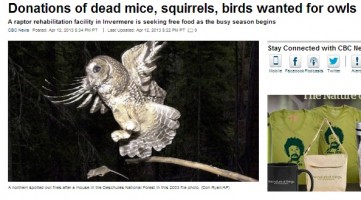 In the circle of life, animals become either prey or predator, or even both. A slight alteration to this natural phenomenon, though, happens when human intervention is needed to care for an animal that is not fully capable of fending for itself. This is the case of a raptor rehabilitation facility in Invermere, British Columbia which had to take out an advertisement to get food for its animal wards. The hospital has called on residents successful in getting rid of rodents to consider donating their haul to the animal facility.
In the circle of life, animals become either prey or predator, or even both. A slight alteration to this natural phenomenon, though, happens when human intervention is needed to care for an animal that is not fully capable of fending for itself. This is the case of a raptor rehabilitation facility in Invermere, British Columbia which had to take out an advertisement to get food for its animal wards. The hospital has called on residents successful in getting rid of rodents to consider donating their haul to the animal facility.
According to Mark Zehnder of the Invermere Veterinary Hospital, a great horned owl and a barred owl currently under their care consume up to a dozen mice a day. The current food stock is not enough for the two captive birds of prey. Zehnder said hundreds of rodents such as mice and squirrels are needed to keep the owls alive throughout spring.
As in previous years when it also issued the plea for donations, the facility said it is willing to buy the owls’ food if it cannot get it free from citizens. At the same time, it clarified a standing requirement for donations: the animals should have died from natural causes. No poisons or toxic substances should have been used to kill the rodents.
“Of course, we don’t want poisoned mice, or we don’t want rodents that have been shot with anything like a lead slug,” Zehnder explained. In case of trapped animals, there is a proper way of handling them, says the animal doctor. “If they can catch them in a trap, then they can put them in a plastic bag in the freezer and if they want to bring them in to us, we’ll be happy to take them,” he added.
The killing of wildlife has been criticized by animal rights advocates in Canada. Even if the animals are hunted and killed for a noble purpose, such as for feeding an endangered species, any method of killing is frowned upon by these activists. Skedaddle—a Canada-based company that banners humane wildlife control—for one, does not employ harmful techniques to prevent wildlife infestation in and outside the home.
The firm follows the mantras of “assess and remove”, “clear and clean” and “prevent and protect.” To get rid of a mouse in wall spaces, for example, Skedaddle will not employ poison or any other harmful chemicals that can endanger the lives of the house’s human and animal inhabitants. It is hoped that other pest control outfits inevitably exercise the same caution, particularly in homes of potential donors of owl-fodder for the avian charges at the Invermere Veterinary Hospital.


